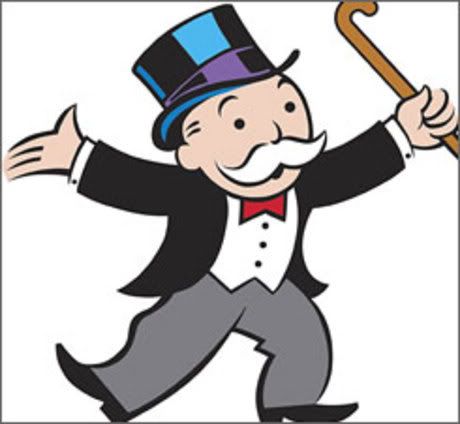I think toys and games (like Monopoly) offer a kind of window into the cultural values we are teaching our children. G.I. Joes and other “boys” toys often teach kids that war, fighting, and physical strength are what make for a “real” man. Barbies, Bratz, and other “girls” toys teach girls that material possessions, clothes, and domestic savvy are what make for a “real” woman. Often, it turns out that these toys end up teaching children lessons that, if analyzed carefully, are not so good.
So what does Monopoly teach children? Let’s look at the structure and object of the game. To win, you must accumulate a series of properties and gain a “monopoly” in a particular area. Where you buy your properties determines how much you will get for them. For example, if you buy "Oriental Avenue" you will not make as much money because minorities drive down property values. You become, in essence, the landlord of these properties. Before you have the monopoly, when people visit your property, they pay a relatively low rent. But once you have a monopoly, and are able to build houses and hotels, you can charge people incredibly high prices.
The same goes for the utilities and railroads. Once you own one electric company, or waterworks, or railroad, you get a relatively small amount when people land on your utility or railroad. But once you own all of the electric companies or water works or railroads, you get to really stick it to people, because there is no competition.
So what values does the game teach? Basically, it teaches that it is good to gain a monopoly on properties and public services, because then you can exploit your tenants and customers, and hopefully take all their money. The game is not about fairness or compassion or sharing. It is about cut-throat exploitation of people for money.
You might be thinking, so what? It’s just a game. But, it turns out that this core value, that it is good to exploit people for money, is a pervasive part of American society. In California, where I live, I don’t get to shop around and choose who I buy electricity from. I have to buy it from Edison, because they basically have a monopoly. If I cannot afford to pay rent on my property, I get kicked out, I might declare bankruptcy, and the owner, the bank (or my landlord), “wins.” On a more personal level, I take a medication that is only available through one manufacturer, so they charge around $300 a month because they can, because they have a monopoly.
It turns out that the board game Monopoly, as fun as it can be, actually celebrates and rewards the very worst tendency in human beings—the tendency to exploit and ruin our fellow humans.

